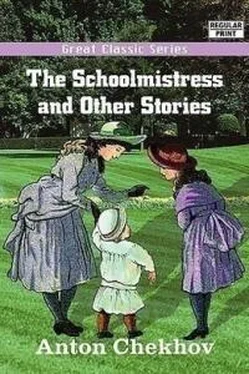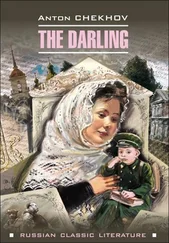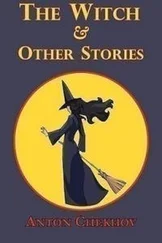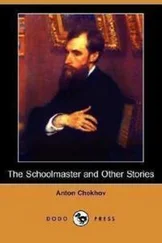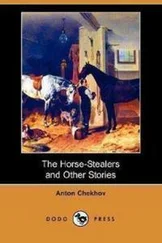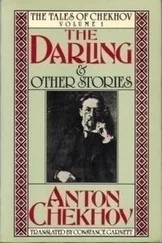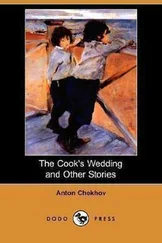Snow was falling.
"Boat!" was shouted on the further side. "Boat!"
The Tatar woke up, and went to wake his mates and row over to the other side. The ferrymen came on to the river–bank, putting on their torn sheepskins as they walked, swearing with voices husky from sleepiness and shivering from the cold. On waking from their sleep, the river, from which came a breath of piercing cold, seemed to strike them as revolting and horrible. They jumped into the barge without hurrying themselves…. The Tatar and the three ferrymen took the long, broad–bladed oars, which in the darkness looked like the claws of crabs; Semyon leaned his stomach against the tiller. The shout on the other side still continued, and two shots were fired from a revolver, probably with the idea that the ferrymen were asleep or had gone to the pot–house in the village.
"All right, you have plenty of time," said Semyon in the tone of a man convinced that there was no necessity in this world to hurry—that it would lead to nothing, anyway.
The heavy, clumsy barge moved away from the bank and floated between the willow–bushes, and only the willows slowly moving back showed that the barge was not standing still but moving. The ferrymen swung the oars evenly in time; Semyon lay with his stomach on the tiller and, describing a semicircle in the air, flew from one side to the other. In the darkness it looked as though the men were sitting on some antediluvian animal with long paws, and were moving on it through a cold, desolate land, the land of which one sometimes dreams in nightmares.
They passed beyond the willows and floated out into the open. The creak and regular splash of the oars was heard on the further shore, and a shout came: "Make haste! make haste!"
Another ten minutes passed, and the barge banged heavily against the landing–stage.
"And it keeps sprinkling and sprinkling," muttered Semyon, wiping the snow from his face; "and where it all comes from God only knows."
On the bank stood a thin man of medium height in a jacket lined with fox fur and in a white lambskin cap. He was standing at a little distance from his horses and not moving; he had a gloomy, concentrated expression, as though he were trying to remember something and angry with his untrustworthy memory. When Semyon went up to him and took off his cap, smiling, he said:
"I am hastening to Anastasyevka. My daughter's worse again, and they say that there is a new doctor at Anastasyevka."
They dragged the carriage on to the barge and floated back. The man whom Semyon addressed as Vassily Sergeyitch stood all the time motionless, tightly compressing his thick lips and staring off into space; when his coachman asked permission to smoke in his presence he made no answer, as though he had not heard. Semyon, lying with his stomach on the tiller, looked mockingly at him and said:
"Even in Siberia people can live—can li–ive!"
There was a triumphant expression on Canny's face, as though he had proved something and was delighted that things had happened as he had foretold. The unhappy helplessness of the man in the foxskin coat evidently afforded him great pleasure.
"It's muddy driving now, Vassily Sergeyitch," he said when the horses were harnessed again on the bank. "You should have put off going for another fortnight, when it will be drier. Or else not have gone at all. …If any good would come of your going—but as you know yourself, people have been driving about for years and years, day and night, and it's alway's been no use. That's the truth."
Vassily Sergeyitch tipped him without a word, got into his carriage and drove off.
"There, he has galloped off for a doctor!" said Semyon, shrinking from the cold. "But looking for a good doctor is like chasing the wind in the fields or catching the devil by the tail, plague take your soul! What a queer chap, Lord forgive me a sinner!"
The Tatar went up to Canny, and, looking at him with hatred and repulsion, shivering, and mixing Tatar words with his broken Russian, said: "He is good…good; but you are bad! You are bad! The gentleman is a good soul, excellent, and you are a beast, bad! The gentleman is alive, but you are a dead carcass…. God created man to be alive, and to have joy and grief and sorrow; but you want nothing, so you are not alive, you are stone, clay! A stone wants nothing and you want nothing. You are a stone, and God does not love you, but He loves the gentleman!"
Everyone laughed; the Tatar frowned contemptuously, and with a wave of his hand wrapped himself in his rags and went to the campfire. The ferrymen and Semyon sauntered to the hut.
"It's cold," said one ferryman huskily as he stretched himself on the straw with which the damp clay floor was covered.
"Yes, its not warm," another assented. "It's a dog's life…."
They all lay down. The door was thrown open by the wind and the snow drifted into the hut; nobody felt inclined to get up and shut the door: they were cold, and it was too much trouble.
"I am all right," said Semyon as he began to doze. "I wouldn't wish anyone a better life."
"You are a tough one, we all know. Even the devils won't take you!"
Sounds like a dog's howling came from outside.
"What's that? Who's there?"
"It's the Tatar crying."
"I say…. He's a queer one!"
"He'll get u–used to it!" said Semyon, and at once fell asleep.
The others were soon asleep too. The door remained unclosed.
THE long goods train has been standing for hours in the little station. The engine is as silent as though its fire had gone out; there is not a soul near the train or in the station yard.
A pale streak of light comes from one of the vans and glides over the rails of a siding. In that van two men are sitting on an outspread cape: one is an old man with a big gray beard, wearing a sheepskin coat and a high lambskin hat, somewhat like a busby; the other a beardless youth in a threadbare cloth reefer jacket and muddy high boots. They are the owners of the goods. The old man sits, his legs stretched out before him, musing in silence; the young man half reclines and softly strums on a cheap accordion. A lantern with a tallow candle in it is hanging on the wall near them.
The van is quite full. If one glances in through the dim light of the lantern, for the first moment the eyes receive an impression of something shapeless, monstrous, and unmistakably alive, something very much like gigantic crabs which move their claws and feelers, crowd together, and noiselessly climb up the walls to the ceiling; but if one looks more closely, horns and their shadows, long lean backs, dirty hides, tails, eyes begin to stand out in the dusk. They are cattle and their shadows. There are eight of them in the van. Some turn round and stare at the men and swing their tails. Others try to stand or lie down more comfortably. They are crowded. If one lies down the others must stand and huddle closer. No manger, no halter, no litter, not a wisp of hay…. [1] On many railway lines, in order to avoid accidents, it is against the regulations to carry hay on the trains, and so live stock are without fodder on the journey.—Author's Note.
At last the old man pulls out of his pocket a silver watch and looks at the time: a quarter past two.
"We have been here nearly two hours," he says, yawning. "Better go and stir them up, or we may be here till morning. They have gone to sleep, or goodness knows what they are up to."
The old man gets up and, followed by his long shadow, cautiously gets down from the van into the darkness. He makes his way along beside the train to the engine, and after passing some two dozen vans sees a red open furnace; a human figure sits motionless facing it; its peaked cap, nose, and knees are lighted up by the crimson glow, all the rest is black and can scarcely be distinguished in the darkness.
Читать дальше
